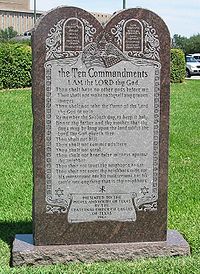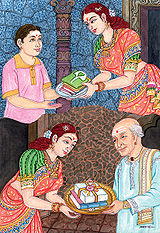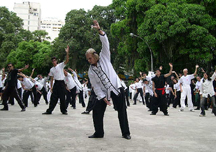
Orthopraxis
Encyclopedia

Greek language
Greek is an independent branch of the Indo-European family of languages. Native to the southern Balkans, it has the longest documented history of any Indo-European language, spanning 34 centuries of written records. Its writing system has been the Greek alphabet for the majority of its history;...
(orthopraxia, meaning "correct action/activity") or an emphasis on conduct, both ethical and liturgical, as opposed to faith
Faith
Faith is confidence or trust in a person or thing, or a belief that is not based on proof. In religion, faith is a belief in a transcendent reality, a religious teacher, a set of teachings or a Supreme Being. Generally speaking, it is offered as a means by which the truth of the proposition,...
or grace
Divine grace
In Christian theology, grace is God’s gift of God’s self to humankind. It is understood by Christians to be a spontaneous gift from God to man - "generous, free and totally unexpected and undeserved" - that takes the form of divine favour, love and clemency. It is an attribute of God that is most...
etc. This contrasts with orthodoxy
Orthodoxy
The word orthodox, from Greek orthos + doxa , is generally used to mean the adherence to accepted norms, more specifically to creeds, especially in religion...
, which emphasizes correct belief, and ritualism, the use of rituals.
While orthodoxies make use of codified beliefs, in the form of creeds, and ritualism more narrowly centers on the strict adherence to prescribed rite
Rite
A rite is an established, ceremonious, usually religious act. Rites in this sense fall into three major categories:* rites of passage, generally changing an individual's social status, such as marriage, baptism, or graduation....
s or ritual
Ritual
A ritual is a set of actions, performed mainly for their symbolic value. It may be prescribed by a religion or by the traditions of a community. The term usually excludes actions which are arbitrarily chosen by the performers....
s, orthopraxy is focused on issues of family, cultural integrity
Cultural heritage
Cultural heritage is the legacy of physical artifacts and intangible attributes of a group or society that are inherited from past generations, maintained in the present and bestowed for the benefit of future generations...
, the transmission of tradition
Tradition
A tradition is a ritual, belief or object passed down within a society, still maintained in the present, with origins in the past. Common examples include holidays or impractical but socially meaningful clothes , but the idea has also been applied to social norms such as greetings...
, sacrificial offerings
Sacrifice
Sacrifice is the offering of food, objects or the lives of animals or people to God or the gods as an act of propitiation or worship.While sacrifice often implies ritual killing, the term offering can be used for bloodless sacrifices of cereal food or artifacts...
, concerns of purity, ethical systems, and the enforcement thereof. Typically, traditional or folk religion
Folk religion
Folk religion consists of ethnic or regional religious customs under the umbrella of an organized religion, but outside of official doctrine and practices...
s (paganism
Paganism
Paganism is a blanket term, typically used to refer to non-Abrahamic, indigenous polytheistic religious traditions....
, animism
Animism
Animism refers to the belief that non-human entities are spiritual beings, or at least embody some kind of life-principle....
) are more concerned with orthopraxy than orthodoxy, and some argue that equating the term "faith
Faith
Faith is confidence or trust in a person or thing, or a belief that is not based on proof. In religion, faith is a belief in a transcendent reality, a religious teacher, a set of teachings or a Supreme Being. Generally speaking, it is offered as a means by which the truth of the proposition,...
" with "religion
Religion
Religion is a collection of cultural systems, belief systems, and worldviews that establishes symbols that relate humanity to spirituality and, sometimes, to moral values. Many religions have narratives, symbols, traditions and sacred histories that are intended to give meaning to life or to...
" presents a Christian
Christian
A Christian is a person who adheres to Christianity, an Abrahamic, monotheistic religion based on the life and teachings of Jesus of Nazareth as recorded in the Canonical gospels and the letters of the New Testament...
-bias
Bias
Bias is an inclination to present or hold a partial perspective at the expense of alternatives. Bias can come in many forms.-In judgement and decision making:...
ed notion of what the primary characteristic of religion is. In the case of Hinduism
Hinduism
Hinduism is the predominant and indigenous religious tradition of the Indian Subcontinent. Hinduism is known to its followers as , amongst many other expressions...
orthopraxy and ritualism are mixed to the point that they become a single identity.
Christianity

Nicene Creed
The Nicene Creed is the creed or profession of faith that is most widely used in Christian liturgy. It is called Nicene because, in its original form, it was adopted in the city of Nicaea by the first ecumenical council, which met there in the year 325.The Nicene Creed has been normative to the...
's "I believe in ..."), some Christian denominations and leaders today, from Roman Catholic to Evangelical Christians, have started to describe their religions as both orthodoxical and orthopraxic. The premise is "correct belief" compels "correct action," and incorrect action is caused by incorrect beliefs.
Taking this combination of "correct belief" and "correct action" a step further, Prosperity theology
Prosperity theology
Prosperity theology or gospel is a Christian religious belief whose proponents claim the Bible teaches that financial blessing is the will of God for Christians. Most teachers of prosperity theology maintain that a combination of faith, positive speech, and donations to Christian ministries will...
, found in charismatic and Pentecostal traditions, teaches correct religious belief and behavior receives material reward and physical healing, in addition to being a necessary component for accepting God's Grace
Divine grace
In Christian theology, grace is God’s gift of God’s self to humankind. It is understood by Christians to be a spontaneous gift from God to man - "generous, free and totally unexpected and undeserved" - that takes the form of divine favour, love and clemency. It is an attribute of God that is most...
. Prosperity theology is a concept known as reciprocity
Ethic of reciprocity
The Golden Rule or ethic of reciprocity is a maxim, ethical code, or moralitythat essentially states either of the following:* : One should treat others as one would like others to treat oneself....
when discussing traditional or ethnic religions such as that in Ancient Greece, but is limited to correct behavior over any one theological idea.
The purpose of Divine law is disputed among Christian denominations
Biblical law in Christianity
Christian views of the Old Covenant have been central to Christian theology and practice since the circumcision controversy in Early Christianity. There are differing views about the applicability of the Old Covenant among Christian denominations...
. A minority are Torah-observant
Mitzvah
The primary meaning of the Hebrew word refers to precepts and commandments as commanded by God...
, sometimes called Jewish Christians
Jewish Christians
Jewish Christians is a term which appears in historical texts contrasting Christians of Jewish origin with Gentile Christians, both in discussion of the New Testament church and the second and following centuries....
, and at the other extreme are antinomistic and anarchistic
Christian anarchism
Christian anarchism is a movement in political theology that combines anarchism and Christianity. It is the belief that there is only one source of authority to which Christians are ultimately answerable, the authority of God as embodied in the teachings of Jesus...
views. In between, most Christians believe that some or all of the Ten Commandments
Ten Commandments
The Ten Commandments, also known as the Decalogue , are a set of biblical principles relating to ethics and worship, which play a fundamental role in Judaism and most forms of Christianity. They include instructions to worship only God and to keep the Sabbath, and prohibitions against idolatry,...
are still binding or have been reinstituted in the Law of Christ. For the teachings of Jesus on the subject, see Ministry of Jesus – Teachings, Sermon on the Mount
Sermon on the Mount
The Sermon on the Mount is a collection of sayings and teachings of Jesus, which emphasizes his moral teaching found in the Gospel of Matthew...
, and Counsels of perfection.
Eastern Christianity
Orthopraxis would include attendance of church services which are designed to benefit the practitioner of the Eastern Orthodox faith. It refers to accepted religious practices and may include both ritual practices as well as interpersonal acts. The Orthopraxy ties into the concept of PhronemaPhronema
Phronema is a transliteration of the Greek word φρόνημα, which has the meanings of "mind", "spirit", "thought", "purpose", "will", and can have either a positive meaning or a bad sense ....
and is meant to work together toward the goal of theosis
Theosis
In Christian theology, divinization, deification, making divine or theosis is the transforming effect of divine grace. This concept of salvation is historical and fundamental for Christian understanding that is prominent in the Eastern Orthodox Church and also in the Catholic Church, and is a...
.
Judaism
JudaismJudaism
Judaism ) is the "religion, philosophy, and way of life" of the Jewish people...
is primarily orthopraxic, with obedience to its laws being the mark of an "observant Jew." However certain laws/commandments of the Torah
Torah
Torah- A scroll containing the first five books of the BibleThe Torah , is name given by Jews to the first five books of the bible—Genesis , Exodus , Leviticus , Numbers and Deuteronomy Torah- A scroll containing the first five books of the BibleThe Torah , is name given by Jews to the first five...
require the acceptance of certain basic beliefs
Jewish principles of faith
The concept of an explicit, paramount definition of faith does not exist in Judaism as it does in other monotheistic religions such as Christianity. Although Jews and religious leaders share a core of monotheistic principles, and there are many fundamental principles quoted in the Talmud to define...
, such as the first and second Positive commandments in Maimonides
Maimonides
Moses ben-Maimon, called Maimonides and also known as Mūsā ibn Maymūn in Arabic, or Rambam , was a preeminent medieval Jewish philosopher and one of the greatest Torah scholars and physicians of the Middle Ages...
' Sefer Hamitzvot
Sefer Hamitzvot
Sefer Hamitzvot is a work by the 12th century rabbi, philosopher and physician Maimonides. While there are various other works titled similarly, the title "Sefer Hamitzvot" without a modifier refers to Maimonides' work...
, which mandate the belief in God and His indivisible unity, or the recitation of the Shema. Thus, describing Judaism solely in orthopraxic terms is not accurate. Additionally, Maimonides
Maimonides
Moses ben-Maimon, called Maimonides and also known as Mūsā ibn Maymūn in Arabic, or Rambam , was a preeminent medieval Jewish philosopher and one of the greatest Torah scholars and physicians of the Middle Ages...
' codification of Jewish law
Halakha
Halakha — also transliterated Halocho , or Halacha — is the collective body of Jewish law, including biblical law and later talmudic and rabbinic law, as well as customs and traditions.Judaism classically draws no distinction in its laws between religious and ostensibly non-religious life; Jewish...
(the Mishneh Torah
Mishneh Torah
The Mishneh Torah subtitled Sefer Yad ha-Hazaka is a code of Jewish religious law authored by Maimonides , one of history's foremost rabbis...
) contains a section entitled Yesodei HaTorah which delineates the legally required beliefs of Judaism, further bolstering the contention that praxis alone is insufficient.
Islam

Five Pillars of Islam
The Pillars of Islam are basic concepts and duties for accepting the religion for the Muslims.The Shi'i and Sunni both agree on the essential details for the performance of these acts, but the Shi'a do not refer to them by the same name .-Pillars of Shia:According to Shia Islam, the...
fundamental to Sunnis prescribe Islamic practice, while Shahadah (profession of faith) defines Islamic belief. Generally stresses Orthopraxy over Orthodoxy, but since the practice is held to come from doctrine, this is essentially orthodoxy applied to practice.
Hinduism

Hinduism
Hinduism is the predominant and indigenous religious tradition of the Indian Subcontinent. Hinduism is known to its followers as , amongst many other expressions...
orthopraxy and ritualism are conflated. Emphasis on ritual vs. personal salvation (moksha
Moksha
Within Indian religions, moksha or mukti , literally "release" , is the liberation from samsara and the concomitant suffering involved in being subject to the cycle of repeated death and reincarnation or rebirth.-Origins:It is highly probable that the concept of moksha was first developed in...
) was a major division in classical Hindu philosophy
Hindu philosophy
Hindu philosophy is divided into six schools of thought, or , which accept the Vedas as supreme revealed scriptures. Three other schools do not accept the Vedas as authoritative...
, epitomized by Purva Mimamsa vs. Uttara Mimamsa (Vedanta).
Ritual (puja) continues to play a central role in contemporary Hinduism
Hinduism
Hinduism is the predominant and indigenous religious tradition of the Indian Subcontinent. Hinduism is known to its followers as , amongst many other expressions...
, but the enormous complexity of ancient ritual (yajna
Yajna
In Hinduism, yajna is a ritual of sacrifice derived from the practice of Vedic times. It is performed to please the gods or to attain certain wishes...
) only survives in a tiny minority of Shrauta practitioners. Even Hindus who diligently practice a subset of prescribed rituals are called orthoprax, to contrast them with other Hindus who insist on the importance of correct belief or understanding. The correctness of one's interpretation of the scripture is then considered less important than following traditions. For example, Srinivasa Ramanujan
Srinivasa Ramanujan
Srīnivāsa Aiyangār Rāmānujan FRS, better known as Srinivasa Iyengar Ramanujan was a Indian mathematician and autodidact who, with almost no formal training in pure mathematics, made extraordinary contributions to mathematical analysis, number theory, infinite series and continued fractions...
was a well-known example of an orthoprax Hindu.
In terms of "proper conduct" and other ethical precepts within the Hindu framework, the core belief involves the divinity of each individual soul (jivatma). Each person harbors this "indwelling God (divinity)"; thus, conduct which unifies society and facilitates progress is emphasized. Self-centered existence is discouraged as a result of this jivatma concept. Interestingly, it's the Uttara Mimamsa philosophical school which seems to explicate this concept so eloquently. Moreover, within the context of Uttara Mimamsa the role of puja (ritual) also involves bringing the individual jivatma closer to the Paramatma (the Transcendent Divinity or God). Individuals who have attained this merging then become the spiritual guides to the community. Later developments within the Hindu religious and philosophic tradition thus try to unify these concepts of ritual, proper conduct, and personal salvation instead of leaving them in mutually conflicting terms. The movement inspired by Pandurang Shastri Athavale termed Swadhyaya seems to be one manifestation of this syncretism. However, other movements within the contemporary Hindu scene are also moving towards this union of external activity and internal development.
Jainism

Jain orthopraxy is based on two factors: Jain siddhanta
Jain philosophy
Jain philosophy deals extensively with the problems of metaphysics, reality, cosmology, ontology, epistemology and divinity. Jainism is essentially a transtheistic religion of ancient India. It is a continuation of the ancient tradition which co-existed with the Vedic tradition since ancient...
(teachings of the Tirthankara) and kriya (practices prevalent at the time of the Tirthankaras). According to Jains, the Tirthankaras based their teachings and philosophy after knowing the realities on this universe (like dravya
Dravya (Jainism)
According to Jain cosmology, the universe is made up of six dravya : sentient beings or souls , non-sentient substance or matter , principle of motion , the principle of rest , space and time . The latter five are united as the ajiva...
and tattva
Tattva (Jainism)
Jain metaphysics is based on seven truths or fundamental principles also known as tattva or navatattva, which are an attempt to explain the nature and solution to the human predicament. The first two are the two ontological categories of the soul jīva and the non-soul ajīva, namely the axiom that...
). Based on these realities, they propounded true and eternal principles like ahimsa, truth, karma etc. that govern the universe. Jain rituals were codified on the basis of these principles to give effect to the teachings of the Tirthankaras.
Taoism

Neopaganism
British Traditional WiccaBritish Traditional Wicca
British Traditional Wicca is a term used to describe some Wiccan traditions which have their origins in the New Forest region of England...
is highly orthopraxic, with "traditions" (as denominations in Wicca
Wicca
Wicca , is a modern Pagan religious movement. Developing in England in the first half of the 20th century, Wicca was popularised in the 1950s and early 1960s by a Wiccan High Priest named Gerald Gardner, who at the time called it the "witch cult" and "witchcraft," and its adherents "the Wica."...
are called) being precisely that—defined by what is traditionally done, rather than shared beliefs. Other Neopagans may or may not share this quality, as noted by James R. Lewis, who draws a distinction between "Religious Neo-Pagans" and "God/dess Celebrants." Lewis states the majority of the Neopagan movement is strongly opposed to Religionist traditions that incorporate any form of orthopraxy or orthodoxy. In fact, many Neopagan organizations, when discussing orthopraxy, limit themselves solely to ritualism.
Polytheistic Reconstructionism
Polytheistic Reconstructionism, such as Hellenismos, provides a stark contrast to popular Neopaganism, being more conservative in nature. These movements seek to revive traditional pre-Christian religions adapted to the modern world, but with an adherence to the values and ethical systems of the ancient cultures, loyalty and reverence toward specific pantheonsPantheon (gods)
A pantheon is a set of all the gods of a particular polytheistic religion or mythology.Max Weber's 1922 opus, Economy and Society discusses the link between a...
, and by promoting traditional interpersonal obligations associated with the family, community, and society. Reconstructionist religions make full use of orthopraxy, defining their practices as a lifestyle, and identifying "correct action" as living life in accord with specific ideals and principles, rather than focusing solely on ritual or promoting a single cosmology, metaphysical idea, or theological theory as absolute truth.
See also
- Cambridge RitualistsCambridge RitualistsThe Cambridge Ritualists, the myth and ritual school, were a recognised group of classical scholars, mostly in Cambridge, England, including Jane Ellen Harrison, Gilbert Murray , A. B. Cook, and others...
- Kalpa (ritual)
- MimamsaMimamsa' , a Sanskrit word meaning "investigation" , is the name of an astika school of Hindu philosophy whose primary enquiry is into the nature of dharma based on close hermeneutics of the Vedas...
- Praxis (Orthodox)
- Ritualism

